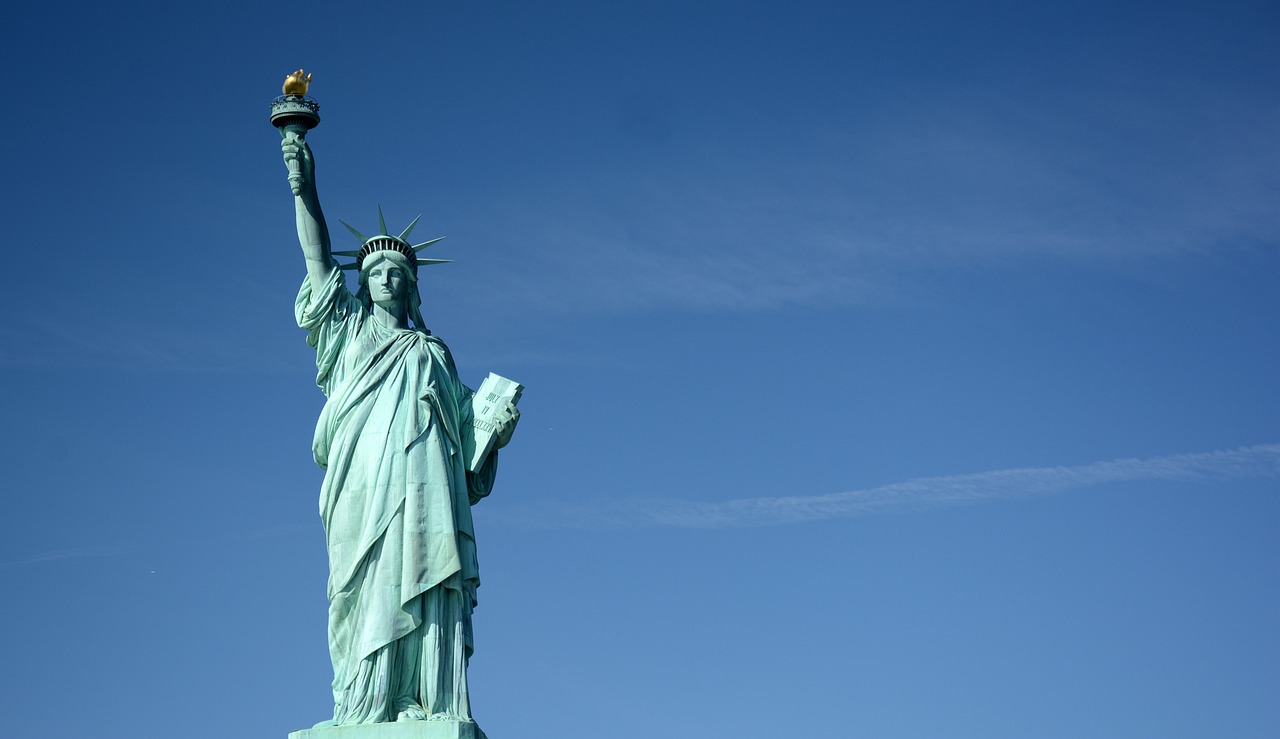
Fraternity: The Long Lost Companion of Liberty and Equality in the United States
Marguerite Hattouni Spencer
Image by Filip Filipović from Pixabay
Our nation is at a crossroads. In light of our calcifying divisiveness in the United States of America, we are worried that our lively constitutional experiment may fail. To get our bearings, it might be helpful to reflect back on what the “land of the free” stands for and what it lacks. A good starting point: The Statue of Liberty and her origins. Is she strong enough to buttress our aspirations, or do we need something more?
La Liberté éclairant le monde (Liberty Enlightening the World) stands resolutely in New York Harbor as a sign of freedom. She was gifted to the United States by France on July 5, 1884, and assembled here in 1886. Édouard de Laboulaye, a leading expert on the U.S. Constitution, proposed the monument, and sculptor Frédéric-Auguste Bartholdi designed it. It commemorates France’s alliance with the colonies during the American Revolution, as well as Lincoln’s victory for democracy. Laboulaye hoped the gift would strengthen the cause for change in France. Replicas can be found in Paris to this day.
Lady Liberty had already been personified by Eugène Delacroix’s in his renowned, La Liberté guidant le peuple, (Liberty Guiding the People) of 1830. The painting captured the bravery of Les Trois Glorieuses (July 27–29, 1830), during which the working- and middle-class citizens set up barricades in Paris to protest restrictions issued by the monarchy. Recall the rousing depiction in Les Misérables. Illustratively, France dramatized this song in the opening ceremony of the 2024 Olympics in front of the Conciergerie, the equivalent of the Tower of London, to capture the triumph over the aristocracy and clergy and the allegiance to liberty, complete with parodies of Marie Antoinette, bloody head in hand.
But why did France gift only Liberty to our nation, when the passionate and persistent rallying cry during the French Revolution was Liberté, Égalité, Fraternité (liberty, equality, fraternity)? Why not gift them all? Certainly, our Revolutionary war was a victory for liberty, and our Declaration of Independence professed equality as self-evident. However, our U.S. Constitution and subsequent laws, despite the Fourteenth Amendment’s Equal Protection Clause, have fallen far short of both liberty and equality for many, including Native Americans, slaves, men without property, women, and a plethora of other marginalized groups to this day. And although we continue to make progress with each generation, we sometimes take steps backward. While both the American and French revolutionary spirit changed the world by formalizing the natural rights to liberty and equality, our nation was missing something just as important from the start–because “fraternité” never got off the boat.
In contrast to our own aspirations, France’s Declaration of the Rights of Man and of the Citizen (1789) balances liberty with a fraternal responsibility toward others. It affirms that the exercise of natural rights can neither harm others, nor infringe on the exercise of anyone else’s rights. Furthermore, any social distinctions that remain must be based on considerations of the common good. Interestingly, Article 2 of Germany’s Basic Law, drafted centuries later, echoes this broad sensibility.
How can we attest to both our lack of and need for fraternity? Legal scholar Mary Ann Glendon argues that our nation’s political rhetoric paints rights as absolute, individual, and without any link to communal responsibilities. Our discourse also glorifies independence and self-sufficiency based on an image of the lone rights-bearer, The Marlboro Man, as a self-determining, unencumbered individual connected to others only by choice or when it suits him.
In her book Rights Talk, The Impoverishment of Public Discourse, Glendon also asserts that the way we talk about rights increases our human predilection to place ourselves at the center of our own moral universe. Together with our achievement-driven Protestant work ethic, our rampant consumerism, and our desire for instant gratification, this rhetoric advances personal interests over that of others. As such, our hyper-individualism leaves us largely without a corresponding sense of responsibility. President John F. Kennedy captured this in his “ask not” inaugural speech.
Glendon concludes that our rights obsession feeds our inability to have productive discussions on how to order our lives together as a nation. While some feel that our current public discourse disarray is attributable to certain political polarities, I assert that it is also caused by fraternity’s absence at the table. So, what can this missing gift offer us? How can we understand its meaning? We can approach these questions utilizing two lenses.
Our first lens relates fraternity to the principles of the common good and solidarity, well-developed in Catholic Social Teaching. In the Vatican II document, Gaudium et Spes (The Church in the Modern World), the common good is defined as, “the sum total of social conditions which allow people, either as groups or as individuals, to reach their fulfillment more fully and more easily.” The common good is aspirational and consists of a trio of values: the dignity of the human person (based on Genesis 1:27), the social well-being of groups, and the general peace secured by public authorities who arbitrate between particular interests. The principle of solidarity, which the Catholic Church describes as brother/sisterhood, requires us by special obligation to be a neighbor to all without exception. For example, addressing socio-economic inequality requires solidarity among and between the rich and poor, employers and employees, and government and the governed. Yet our nation is divided over how to best address this issue. Is poverty attributed to the lack of hard work – or is it linked to circumstances beyond personal control?
The Rev. Dr. Martin Luther King, Jr., at a 1956 banquet honoring him for “Christian leadership in the cause of first class citizenship for all mankind,” drew upon both of these principles as well. He calls each of us to put our vocation to use within the political community in service of the common good and in solidarity with the whole social organism. When disagreement arises, say around poverty, King insists that we must accept the legitimacy of different opinions and respect citizens who defend their points of view by honest methods. He further insists that political parties must prioritize the whole of our nation’s needs over their own interests. Perhaps we could reframe our divisive discourse around what is good for the individual and the community, while standing together with empathy and openness to the ideas of “the other side.”
Our second lens through which to view fraternity draws on the way God loves us. At a most basic level, King describes God’s expression of love as agape, a purely spontaneous, unmotivated, groundless, sacrificial, and creative posture that expects nothing in return. It is the love of God operating in the human heart that embraces even our enemies, who we can win over with our kindness. According to John Dominic Crossan and Jonathan L. Reed,a more daring translation of agape is “to share” what is ours and distribute equitably what is God’s.
In her 1978 book Models of God: Theology for an Ecological, Nuclear Age, Sally McFague paints a rich picture of the triune God as the communion of three persons bound by eternal love (perichoresis). By imitating this loving relationship, we can bind together our individual liberties. McFague goes on to describe God the father as mother, who nurtures a closeness beyond the traditional unmoved mover (agape); God the son as our lover, who has the deepest relationship and valuation of the other (eros); and God the Holy Spirit, who is our friend and sustaining companion (philia). Drawing upon John Wesley and C.S. Lewis, friends stand side by side, sharing visions and undertaking missions together, all while extending their hand in friendship to others.
Theologian Joas Adiprasetya even argues that friendship holds primacy over agape by creating a welcoming space for others. This involves vulnerability, reimagination, compassion and the power of the prophetic. But friendship must be put to use, which is risky and unpredictable, for as Jesus stresses in John 15:13 (NIV), “Greater love has no one than this: to lay down one’s life for one’s friends.”
Equally important to our exploration of fraternity is the belief that God’s love calls us to liberate the oppressed and create a beloved community. As the Martin Luther King, Jr. Center for Nonviolent Social Change (The King Center) explains, our mutual cooperative efforts will replace poverty, hunger, and homelessness with international standards of human decency; and our all-inclusive spirit of sisterhood and brotherhood will replace discrimination, bigotry, and prejudice with a world in which all people can be included in our democracy. The King Center concludes that throughout these endeavors, and unlike our current political climate, disputes must be resolved by nonviolent, peaceful conflict resolution accompanied by conciliation with our adversaries. In his encyclical Fratelli Tutti (On Fraternity and Social Friendship), Pope Frances concurs. He writes that St. Francis, his namesake, “did not wage a war of words aimed at imposing doctrines; he simply spread the love of God.”
One example of fraternity in action is the first-ever sports organization’s “Beloved Community Team.” Led by WNBA’s Atlanta Dream in partnership with The King Center, the team helps train advocates committed to the Center’s BE LOVE pledge: (1) to acknowledge that the violence, oppression, inequity, injustice and hate in our world has to stop; (2) to be a social change agent in the creation of a more just, humane, equitable, and peaceful world; and (3) to forgo inaction for the courage to stand up for justice. This includes supporting leaders who demonstrate a love for the entire human family. As Jesus confirms, “Truly I tell you, whatever you did for the least of these brothers and sisters of mine, you did for me.” (Matt. 25:40, NIV).
Given these lenses, we can agree that our nation comes up short when it comes to fraternity. But it is one thing to agree that we need to increase solidarity and draw upon God’s love in the pursuit of the common good, and another to consider how. I maintain that the only way we can advance in this pursuit is through structural, institutional, and systemic change. Our laws and social structures create institutions, e.g., schools, that employ systems, e.g., the school-to-prison pipeline, that lead to inequalities. All three levels of injustice must be addressed to meet the needs of every person. This work requires that we temper our individualism and embrace our communities so that both can prosper. It also requires that we shift our discourse to include broader goals, not partisan platforms, because liberty and equality are faltering on their own.
A final and timely thought on fraternity in an election year comes from King. In order to create a society where we live and work together in mutuality, not divisiveness, he maintained that “Citizens must cultivate a generous and loyal spirit of patriotism, but without being narrow-minded. This means that they will always direct their attention to the good of the whole human family, united by the different ties which bind together races, people and nations.” If we act on this call and embrace a hope that Pope Francis believes can lift our spirits to lofty realities like truth, justice and love, we can achieve great things. If this is bold, our nation may grow even stronger than the copper-clad iron Lady Liberty herself–stronger in fraternity. ♦

Marguerite Hattouni Spencer is a Senior Adjunct Faculty member of the Department of Theology at the University of St. Thomas in St. Paul, Minnesota, specializing in courses at the intersection of law, religion, and civil rights. She holds an A.M.R.S from the University of Chicago Divinity School and a J.D. from the University of Minnesota Law School.
Recommended Citation
Spencer, Marguerite Hattouni. “Fraternity: The Long Lost Companion of Liberty and Equality in the United States.” Canopy Forum, October 30, 2024. https://canopyforum.org/2024/10/30/fraternity-the-long-lost-companion-of-liberty-and-equality-in-the-united-states/.
Recent Posts










